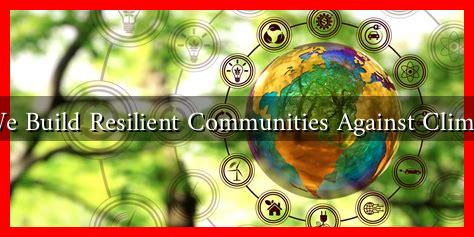-
Table of Contents
- How Can We Build Resilient Communities Against Climate Change?
- Understanding Community Resilience
- Strategies for Building Resilient Communities
- 1. Community Engagement and Education
- 2. Infrastructure Investment
- 3. Promoting Sustainable Practices
- 4. Building Social Networks
- Case Studies of Resilient Communities
- Conclusion
How Can We Build Resilient Communities Against Climate Change?
As climate change continues to pose significant threats to ecosystems, economies, and human health, building resilient communities has become a pressing necessity. Resilience refers to the ability of a community to withstand, adapt to, and recover from adverse conditions, including extreme weather events, rising sea levels, and other climate-related challenges. This article explores effective strategies for fostering resilience in communities, supported by case studies and statistics.
Understanding Community Resilience
Community resilience encompasses various dimensions, including social, economic, and environmental factors. A resilient community is one that can effectively respond to climate-related challenges while ensuring the well-being of its residents. Key components of community resilience include:
- Social Cohesion: Strong social networks and community ties enhance collective action and support during crises.
- Economic Diversification: A diverse economy can better absorb shocks and provide alternative livelihoods.
- Infrastructure Preparedness: Robust infrastructure can withstand extreme weather events and facilitate recovery.
- Environmental Stewardship: Sustainable practices help protect natural resources and mitigate climate impacts.
Strategies for Building Resilient Communities
To build resilience against climate change, communities can adopt several strategies:
1. Community Engagement and Education
Engaging community members in discussions about climate change and resilience is crucial. Education initiatives can empower residents to take action and prepare for potential climate impacts. For example, the Natural Resources Defense Council (NRDC) offers resources for communities to develop resilience plans, emphasizing the importance of local knowledge and participation.
2. Infrastructure Investment
Investing in resilient infrastructure is vital for protecting communities from climate impacts. This includes:
- Upgrading drainage systems to prevent flooding.
- Building seawalls and levees in coastal areas.
- Implementing green infrastructure, such as parks and green roofs, to manage stormwater.
For instance, New York City has invested in its Special Initiative for Rebuilding and Resiliency, which focuses on enhancing infrastructure to withstand future storms and flooding.
3. Promoting Sustainable Practices
Encouraging sustainable practices within communities can mitigate climate change effects. This includes:
- Implementing energy-efficient technologies.
- Promoting local food systems to reduce carbon footprints.
- Encouraging the use of renewable energy sources.
The city of San Diego has made strides in sustainability by adopting a Climate Action Plan that aims to reduce greenhouse gas emissions and promote clean energy.
4. Building Social Networks
Strong social networks can enhance community resilience by fostering collaboration and support. Initiatives such as neighborhood associations, community gardens, and local volunteer programs can strengthen ties among residents. For example, the Urban Institute highlights the role of social capital in enhancing resilience, showing that communities with strong social networks recover more quickly from disasters.
Case Studies of Resilient Communities
Several communities worldwide have successfully implemented resilience-building strategies:
- New Orleans, USA: After Hurricane Katrina, New Orleans focused on rebuilding with resilience in mind, investing in flood protection and community engagement.
- Rotterdam, Netherlands: This city has become a model for climate adaptation, incorporating green roofs and water plazas to manage excess rainwater.
- Dhaka, Bangladesh: Facing severe flooding, Dhaka has developed community-based disaster management programs that empower local residents to respond effectively to climate threats.
Conclusion
Building resilient communities against climate change is not only a necessity but also an opportunity to create stronger, more cohesive societies. By focusing on community engagement, infrastructure investment, sustainable practices, and social networks, we can enhance our ability to withstand and adapt to the challenges posed by climate change. As demonstrated by successful case studies, resilience is achievable through collective action and commitment. The time to act is now, as the future of our communities depends on our ability to adapt and thrive in an increasingly uncertain world.

